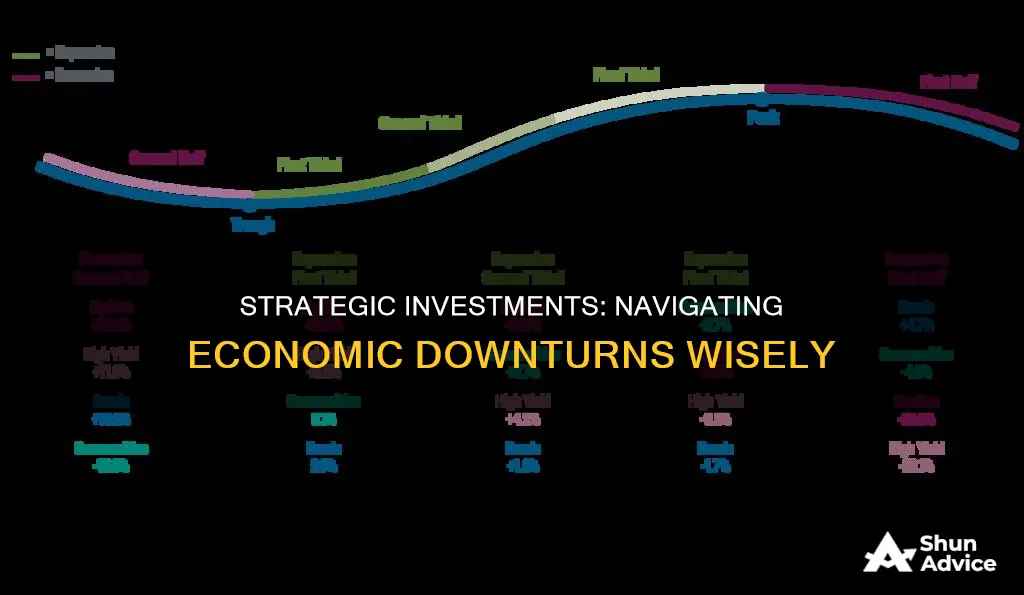
During an economic downturn, investors need to act cautiously but remain vigilant in monitoring the market landscape for opportunities to pick up high-quality assets at discounted prices. While it is tempting to ride out a recession with no exposure to stocks, investors may find themselves missing out on significant opportunities.
- Invest in high-quality companies: Look for companies with strong balance sheets, low debt, good cash flow, and a history of performing well during tough economic times. Avoid highly leveraged, cyclical, or speculative companies as they pose a higher risk of performing poorly.
- Focus on recession-resistant industries: Some industries tend to be more recession-resistant, such as utilities, consumer staples (e.g., food, beverages, household goods), and discount retailers. These companies typically see an increase in demand as consumers cut back on more expensive goods or brands.
- Consider real estate: Real estate is less volatile than stocks and can provide income and utility. It can act as a hedge during a stock market crash as money tends to flow into treasury bonds and real assets.
- Go long on US Treasuries: When the economy is struggling, investors often seek the safety of US Treasury bonds. ETFs such as IEF (iShares 7+ Year Treasuries) and TLT (iShares 20+ Year Treasuries) are popular choices.
- Invest in gold: Gold is a hard asset that tends to do well during economic downturns. It is a commodity that can be traded, and its value increases as the economic situation deteriorates.
- Focus on long-term investing: For those with a long investment horizon (e.g., under 40 or with at least 20 years of work left), it may be best to continue taking risks and investing for the long term. Markets tend to recover over time, and by combining low spending with long-term compounding, investors can achieve significant gains.
| Characteristics | Values |
|---|---|
| Riskier assets | Lose value |
| Gold | Appreciates |
| U.S. Treasuries | Appreciates |
| Large companies | Outperform |
| Strong balance sheets | Outperform |
| Healthy cash flows | Outperform |
| Consumer staples | Outperform |
| High-yield bonds | Lose value |
| Commodities | Lose value |
| High-risk assets | Lose value |
| Luxury sector | Lose value |
| Non-essential goods and services | Lose value |
What You'll Learn

Invest in real estate
Real estate can be a good investment during an economic downturn. Here are some reasons why, along with some tips on how to approach it.
Real estate can be a good investment during an economic downturn for several reasons:
- It's a tangible asset that can grow in value: Real estate provides a physical asset that can appreciate over time. It tends to be more stable than stocks or bonds, offering investors a way to diversify their portfolios.
- It's a hedge against inflation: Real estate values often keep pace with or exceed inflation rates, making it a good way to preserve and grow your wealth during periods of rising prices.
- It offers stable income: Real estate can provide a steady income stream through rent collection, which can be especially valuable during economic downturns when other sources of income may be less reliable.
- It's less susceptible to wild price swings: Real estate values don't fluctuate as wildly as stocks and other assets, providing a more stable investment option during uncertain economic times.
- It's in demand: People always need housing, even during economic downturns. This can lead to increased demand for rental properties, providing a steady source of income for real estate investors.
Tips for Investing in Real Estate During an Economic Downturn
If you're considering investing in real estate during an economic downturn, here are some tips to keep in mind:
- Do your research: Understand the market and create a plan with the help of expert advisors. Be prepared to act quickly when the right opportunity arises.
- Have a solid financial foundation: Ensure you have a high credit score, strong cash flow, and a stable financial situation before investing. This will help you secure financing and weather any potential downturns in the market.
- Be patient and disciplined: Don't panic or make impulsive decisions. Stick to your long-term investment strategy and focus on quality, value, and discipline.
- Consider diversification: Instead of investing in a single property, consider diversifying your risk by investing in REITs (Real Estate Investment Trusts) or real estate crowdfunding platforms. This way, you can still benefit from the advantages of real estate investment while reducing your concentration risk.
- Look for good deals: During an economic downturn, there may be opportunities to find properties at bargain prices. Be on the lookout for these deals, as they can provide excellent long-term returns.
- Monitor expenses: Keep a close eye on both fixed and variable expenses associated with your real estate investments. Ensure that your variable expenses are providing a positive return on investment.
- Get to know your tenants: Building good relationships with your tenants can help improve satisfaction and retention. Be cautious about increasing rents during an economic downturn, and prioritize communication and reasonable lease changes.
Private Equity Investing: A Comprehensive Guide
You may want to see also

Invest in gold
Gold is a stable investment option that has been valued by humans for thousands of years. It is a safe haven asset that acts as a hedge against inflation and the potential volatility of other assets' prices.
Gold has a long record of being used as a source of wealth and a means of exchange. Its purchasing power generally remains steady or increases over time, making it a good way to protect against the rapid erosion of wealth during periods of inflation, which often coincide with recessions.
Gold is also a valuable diversification tool for investors' portfolios. Its price is less affected by recessions than many other commodities, as it is consistently in demand worldwide. Historical analysis shows that gold has outperformed stocks during periods of significant economic downturn. For example, during the 2008 financial crisis, gold jumped an astounding 46% while the S&P 500 declined by 27%.
Gold's value is also linked to market uncertainty. During times of geopolitical unrest and economic policy uncertainty, investors tend to gravitate towards gold as a safe investment option.
However, it is important to note that gold does not always perform well against the US dollar, which produces a yield. Gold is also subject to volatile price movements, and its performance as an investment can depend on various factors such as interest rates, inflation, and economic conditions.
Overall, gold is a good investment option during an economic downturn due to its stable value, hedge against inflation, and diversification benefits.
Unlocking Private Equity: A Guide to Smart Investing
You may want to see also

Invest in US Treasury bonds
US Treasury bonds are a good investment during an economic downturn because they are backed by the full faith and credit of the US government. They are typically seen as safe investments during a recession.
Treasury bonds are long-term debt securities issued by the US government. They have maturities of 20 to 30 years and pay a fixed interest rate semiannually.
In times of market volatility, investors may flock towards Treasury bonds, seeking stability. US Treasury bonds are similar to government and corporate bonds, as they are backed by the full faith and credit of the US government. They are typically seen as safe investments during a recession.
During an economic downturn, investors frequently flock to gold as it's seen as a hedge against stock market volatility. While it frequently has a low correlation to stocks, the two asset classes do, at times, move in the same direction.
The performance of gold, like that of stocks, depends on numerous factors, including market and economic conditions, interest rates, and geopolitical events. Gold is often considered a safe-haven asset in times of economic uncertainty due to its perceived store of value. During recessions, gold prices may rise as investors look for ways to protect their wealth from market volatility.
There are two of the most common ETFs to buy: IEF (iShares 7+ Year Treasuries) and TLT (iShares 20+ Year Treasuries). Buying TLT will give you more upside and volatility given that longer-duration bonds are more sensitive to interest rate changes.
Notice how TLT spiked from $92.83 on Oct 1, 2008, to $119.35 on Dec 1, 2008 (+28.6%) during the depths of the financial crisis. There have been several more 20%+ trading opportunities since 2008 due to geopolitical risk, policy risk, and further stock market sell-offs.
It's interesting to note that even if you had bought TLT at its high during the crisis, you're back to even today while earning a steady ~3% annual yield. Bond funds like TLT have gotten demolished since 2020. Dollar-cost averaging now may pay good dividends in the future.
At least buy some individual Treasury bonds yielding 5%+ and hold them to maturity.
Kids' Guide to Saving and Investing Wisely
You may want to see also

Invest in high-quality companies with strong balance sheets and low debt
During an economic downturn, investors need to act cautiously but remain vigilant in monitoring the market landscape for opportunities to pick up high-quality assets at discounted prices. These are challenging environments, but they also coincide with the best opportunities.
In a recessionary environment, the worst-performing assets are highly leveraged, cyclical, and speculative. Companies that fall into any of these categories can be risky for investors because of their potential to go bankrupt. Conversely, investors who want to survive and thrive during a recession will invest in high-quality companies with strong balance sheets, low debt, good cash flow, and are in industries that historically do well during tough economic times.
During a recession, most investors should avoid investing in companies that are highly leveraged, cyclical, or speculative, as these companies pose the biggest risk of performing poorly during tough economic times. A better strategy is to invest in well-managed companies with low debt, good cash flow, and strong balance sheets.
- Study the company's financial reports: By reviewing a company's financial statements, you can assess its financial health and stability. Look for companies with low debt, healthy cash flows, and profitability.
- Focus on industries with recession-resistant businesses: Some industries tend to be more resilient during economic downturns. Consider sectors such as utilities, consumer staples, and discount retailers. These industries often experience stable demand and are less vulnerable to economic fluctuations.
- Seek companies with strong business models: Look for companies that can maintain steady operations and financial performance despite the economic headwinds. Examples include utilities, basic consumer goods conglomerates, and defence stocks.
- Assess the company's debt management: Companies with strong balance sheets have a lower vulnerability to tightening credit conditions and find it easier to manage their debt obligations. Avoid companies with huge debt loads and high-interest payments, as they may struggle during a recession.
- Consider countercyclical stocks: These are stocks that tend to perform well during recessions due to increased demand or economic uncertainty. Their stock prices generally move in the opposite direction of the prevailing economic trend.
- Diversification and risk management: While investing in high-quality companies is important, diversification across different sectors and asset classes is also crucial. Maintain a balanced portfolio to reduce overall risk.
Understanding Portfolio Investment: Definition and Key Concepts
You may want to see also

Diversify your portfolio
Diversifying your portfolio is a key strategy to protect your investments during an economic downturn. Here are some ways to do this:
Diversify Across Asset Classes
Investing in a variety of asset classes can help spread your risk. Traditional asset classes include stocks, bonds, cash, and alternative investments. During an economic downturn, it is generally recommended to reduce your allocation to stocks, which tend to be riskier, and increase your allocation to bonds and cash, which are considered safer investments.
Diversify Within Asset Classes
It is also important to diversify within each asset class. For example, when investing in stocks, ensure your portfolio includes a mix of large-cap, mid-cap, and small-cap companies from different sectors. This reduces the impact of any one company or sector underperforming. Similarly, when investing in bonds, diversify across different types of bonds, such as government bonds, corporate bonds, and municipal bonds, as well as bonds with different maturity dates.
Diversify Geographically
Another aspect to consider is geographic diversification. Investing in companies and assets from different countries and regions can help protect your portfolio from the risks associated with any one market. For example, if the US market is experiencing a downturn, having investments in European or Asian markets may provide a hedge.
Diversify Across Time
Dollar-cost averaging is a strategy that involves investing a fixed amount at regular intervals, regardless of the market conditions. This approach helps to smooth out the highs and lows of the market and ensures you are not investing a large sum right before a market downturn. It also takes advantage of market dips by purchasing more units of an investment when prices are low.
Regularly Rebalance Your Portfolio
Over time, your portfolio may become unbalanced as some investments outperform others. Rebalancing involves periodically buying or selling certain investments to return your portfolio to your desired asset allocation. For example, if stocks have been performing well, they may now make up a larger percentage of your portfolio than you intended. By selling some stocks and buying bonds or other assets, you can return to your desired allocation and reduce your risk exposure.
By implementing these diversification strategies, you can help protect your portfolio during an economic downturn and position yourself to benefit from the eventual recovery.
Africa's Small Investment Guide: Getting Started
You may want to see also
Frequently asked questions
Some good investments during a recession include gold, U.S. Treasuries, and shares of large companies with ample, steady cash flows and dividends.
It is wise to avoid investing in high-risk assets, such as small-cap stocks, cryptocurrencies, and overly leveraged companies.
A good investment strategy during a recession is to focus on long-term, financially stable companies with strong balance sheets and low debt.
To protect your portfolio during a recession, consider setting up multiple portfolios with different time horizons and risk tolerances. This will ensure you have cash flow secured in the near term while also taking advantage of long-term growth opportunities.
Real estate can be a good investment during a recession as it is less volatile, produces income, and provides utility. However, it is important to do your research and understand what you are investing in.







